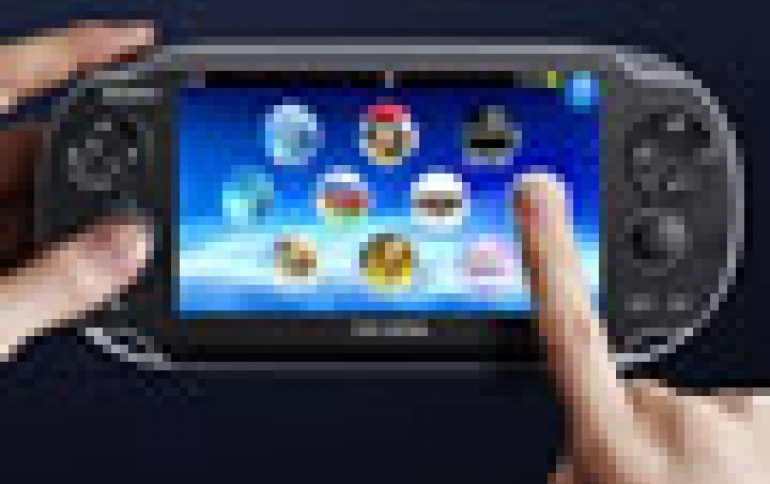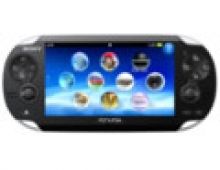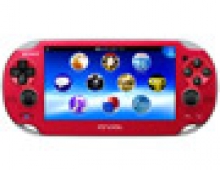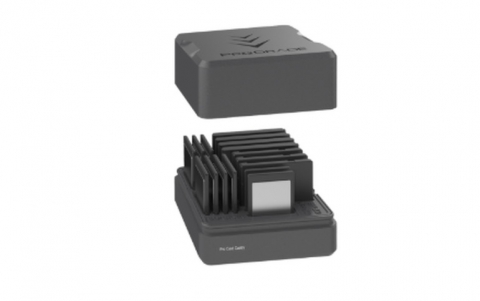
PS Vita to Sell 12.4 Million Units Globally
Despite PlayStation Vita's strong content line-up, creative gaming capabilities and great internet experience, the device faces enormous challenges if it is to succeed in an increasingly converging marketplace.
With the might of Sony's marketing machine behind it, yesterday's launch of Sony's PlayStation Vita in North America and Europe underlines the company's hopes that this next generation portable game console can turnaround the fortunes of its loss-making Consumer Products & Services segment.
Strategy Analytics forecast PlayStation Vita will sell 12.4 million units globally this year (assuming a price cut sometime this year). Vita's hardware sales could reach $2.2 billion assuming a $180 average retail price. This is a revenue increase of more than $1.2 billion per year. However, given console hardware?s small margin, the contributing profit from PlayStation Vita hardware will be significantly lower, so the hardware itself will not save the struggling company from its current turmoil, Strategy Analytics says.
"The real value of the PlayStation Vita is its drive for content revenue growth and its strategic position in Sony's entertainment ecosystem. The PlayStation Store will have a vital role in selling games, videos and other content through its online access," explained Jia Wu, Senior Analyst for Connected Home Devices at Strategy Analytics. "We believe that PlayStation Vita will cause Sony's 2012 portable console software revenue to grow by $800 million compared with 2011. Although it's too small a device to turn the company around in terms of financial contribution, we expect it to bring in $2 billion incremental revenue from both hardware and software sales in 2012."
"Crucially the cross-platform availability of content will also boost Sony's position in competition with giants Apple, Samsung and Microsoft. Sony can leverage its console gaming business, which Apple and Samsung do not have, to build its online content cloud. Despite the popularity of Xbox 360, Microsoft lacks a serious portable console and mobile gaming device. So with PlayStation Vita, Sony further strengthens its brand, device competition and future content reach - even if the console hardware itself will not generate much profit," the analyst added.
The gradually improving gaming capability on smartphones and tablets is a serious threat for dedicated portable gaming consoles. As smartphones become ubiquitous and tablets see growing penetration, the vast majority of consumers already have multiple portable devices that can handle casual gaming. While those games platforms are not currently of the quality of dedicated consoles, they are good enough for many casual gamers.
Jia Wu summarizes the situation, "To survive the march of smartphone's entering the casual gaming space, Sony needs to achieve the Holy Grail of inventing innovative new gameplay whilst at the same time investing heavily in exclusive content."
In the time of austerity, consumers are considerably sensitive to prices, and Nintendo proved that a price cut can save a product. Their decision to slash the price of 3DS's from $249 to $169 revived sales of the console. Sony now is experiencing the same story in Japan. Sales of the Wi-Fi version of PlayStation Vita at $249 initially exploded, selling more than 300,000 units in the first week of release. But the new console is barely moving 20,000 units per week in its home market after all the hard-core fans made their purchases, mirroring the experience of the Nintendo 3DS.
Strategy Analytics expects sales of PlayStation Vita in North America and Europe to follow the same pattern, suggesting that a price cut will be essential to stimulate sales and forge a competitive position. Despite the solid design and strong processing power, it is challenging to convince consumers to buy a dedicated game console above the $200 price range in today's economic environment as Nintendo has learnt.
"Sales of 3G models will be a particular challenge as it demands a $50 premium and additional data plan charges and in the long run is likely to represent only a small portion of total PlayStation Vita sales," Strategy Analytics said.
Strategy Analytics forecast PlayStation Vita will sell 12.4 million units globally this year (assuming a price cut sometime this year). Vita's hardware sales could reach $2.2 billion assuming a $180 average retail price. This is a revenue increase of more than $1.2 billion per year. However, given console hardware?s small margin, the contributing profit from PlayStation Vita hardware will be significantly lower, so the hardware itself will not save the struggling company from its current turmoil, Strategy Analytics says.
"The real value of the PlayStation Vita is its drive for content revenue growth and its strategic position in Sony's entertainment ecosystem. The PlayStation Store will have a vital role in selling games, videos and other content through its online access," explained Jia Wu, Senior Analyst for Connected Home Devices at Strategy Analytics. "We believe that PlayStation Vita will cause Sony's 2012 portable console software revenue to grow by $800 million compared with 2011. Although it's too small a device to turn the company around in terms of financial contribution, we expect it to bring in $2 billion incremental revenue from both hardware and software sales in 2012."
"Crucially the cross-platform availability of content will also boost Sony's position in competition with giants Apple, Samsung and Microsoft. Sony can leverage its console gaming business, which Apple and Samsung do not have, to build its online content cloud. Despite the popularity of Xbox 360, Microsoft lacks a serious portable console and mobile gaming device. So with PlayStation Vita, Sony further strengthens its brand, device competition and future content reach - even if the console hardware itself will not generate much profit," the analyst added.
The gradually improving gaming capability on smartphones and tablets is a serious threat for dedicated portable gaming consoles. As smartphones become ubiquitous and tablets see growing penetration, the vast majority of consumers already have multiple portable devices that can handle casual gaming. While those games platforms are not currently of the quality of dedicated consoles, they are good enough for many casual gamers.
Jia Wu summarizes the situation, "To survive the march of smartphone's entering the casual gaming space, Sony needs to achieve the Holy Grail of inventing innovative new gameplay whilst at the same time investing heavily in exclusive content."
In the time of austerity, consumers are considerably sensitive to prices, and Nintendo proved that a price cut can save a product. Their decision to slash the price of 3DS's from $249 to $169 revived sales of the console. Sony now is experiencing the same story in Japan. Sales of the Wi-Fi version of PlayStation Vita at $249 initially exploded, selling more than 300,000 units in the first week of release. But the new console is barely moving 20,000 units per week in its home market after all the hard-core fans made their purchases, mirroring the experience of the Nintendo 3DS.
Strategy Analytics expects sales of PlayStation Vita in North America and Europe to follow the same pattern, suggesting that a price cut will be essential to stimulate sales and forge a competitive position. Despite the solid design and strong processing power, it is challenging to convince consumers to buy a dedicated game console above the $200 price range in today's economic environment as Nintendo has learnt.
"Sales of 3G models will be a particular challenge as it demands a $50 premium and additional data plan charges and in the long run is likely to represent only a small portion of total PlayStation Vita sales," Strategy Analytics said.





















